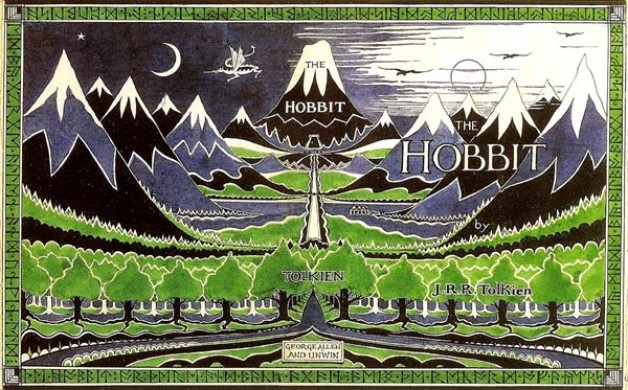J.R.R. Tolkien imbued meaning and purpose into his literary work. The world of The Hobbit is not a world of random chance where anything goes; in fact nothing could be further from the truth. The Hobbit tells the classic adventure story, the kind of story ordinary people naturally crave. The trademark of such a tale—a story which appeals to every person’s desire for truth, goodness, and beauty—is the dramatic difference between good and evil. In such a story good vanquishes evil, beauty conquers the repulsive, and characters rise to the challenges placed before them to fulfill their destinies. Within such a story, the hobbit Bilbo Baggins does not have to grapple with an existentialist crisis, nor carry the burden of creating his own meaning in light of the perceived absurdity of the world. Far from being an isolated and angst-ridden protagonist from Sartre’s Nausea, Bilbo joins Gandalf and the dwarves on a quest that has every appearance of being directed by providence itself.
So if one accepts that a story like The Hobbit can touch on the deepest, most meaningful things in life, it stands to reason that a thing or two can be learned from the novel’s hero. What kind of hero is Bilbo Baggins? Which of his traits are worthy of our imitation and how might they improve our own spiritual lives?
1. Simplicity. Bilbo Baggins is not a complicated sort of hobbit. Self-respecting hobbits keep their holes tidy, in good order, and don’t go longing after crazy things like adventures. When Gandalf mentions he’s having difficulty finding someone to join his adventure, Bilbo replies quite tersely, “I should think so—in these parts! We are plain quiet folk and have no use for adventures. Nasty disturbing uncomfortable things! Make you late for dinner! I can’t see what anybody sees in them.” Close-minded though this may seem to some, Bilbo exhibits a certain virtue here. He is a man of routine and order—things which adventures by their very nature disrupt. The spiritual life needs this sort of constancy. Simply flitting about will not do. Tradition shows that growth in faith, hope, and charity is greatly aided by a well-ordered life.
2. Docility. Although Bilbo loves his neatly structured life, he is not paralyzed at the invitation to go adventuring. At Gandalf’s prodding, Bilbo freely sets out to join his dwarfish companions. Even if he is a reluctant adventurer, Bilbo implicitly trusts Gandalf and heeds his prompting. So too, the spiritual life needs docility. If we become too set in our ways, we limit our openness to the workings of God’s grace in our lives. By saying yes to adventuring, Bilbo sets out along a path that radically alters the course of his life. In the end Gandalf remarks, “My dear Bilbo! Something is the matter with you! You are not the hobbit that you were.” If we are docile, we, too, will be changed by our own spiritual journeys.
3. Courage. On more than one occasion Bilbo faces real peril. He challenges a hoard of spiders and talks face-to-face with a truly evil dragon. These are not the challenges of quiet hobbit life in the Shire: They require real courage! More than once, Bilbo comes to the aid of his fellow travelers as they venture to the Misty Mountains, much to the surprise of his companions. Faced with many questions on their journey, “it was from little Bilbo that they seemed to expect to get the answers. From which you can see that they had changed their opinion of Mr. Baggins very much, and had begun to have a great respect for him.” Similarly in the spiritual life, when we are faced with threats and dangers we must summon our courage and press on in hope. Bilbo, drawing on courage he did not know he had, boldly confronted his enemies. In the spiritual life, when we ourselves are in moments of dire need, we will find in the Holy Spirit our true source of strength and our reason to take courage.
4. Joy. Hobbits are not by nature solemn creatures. They love to talk and laugh and sing. They especially love to eat and will have dinner twice a day whenever they can get it. This love of song, feasting, and company is characteristic of a joyful life—not joyful simply because of song, feasting, or company in themselves, but because life is filled with meaning and purpose. For that they have reason to sing and make merry. Bilbo returns home to Bag-End changed by his adventure, but “he remained very happy to the end of his days.” As Christians, we are also “foreigners to worry and friends of gaiety” because, like Bilbo, we can trust our lives to the workings of providence. This is a true cause for rejoicing!
With hobbit-like simplicity, docility, courage and joy, we continue to journey ever onward until that day when we are at last called home. On that day the shadow of our earthly joy will give way to true eternal delight in the awesome vision of the face of God.
✠
Image: J.R.R. Tolkien, The Hobbit‘s original dust-jacket design







